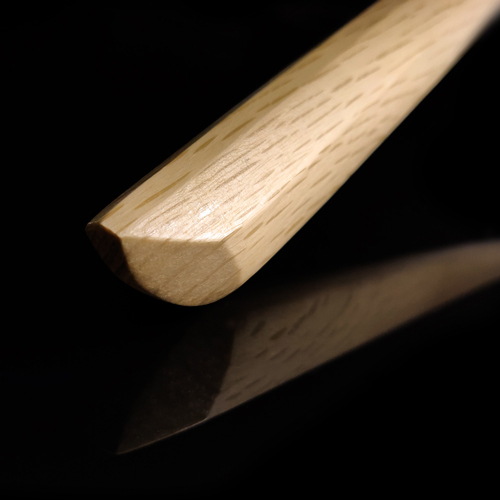Wooden weapons, like Bokken, Jo, and Okinawan Bo, are an important tool for martial artists and in order to maintain their integrity and ensure their longevity, regular maintenance is necessary. Here we talk about some simple actions that we recommend that everyone to do to properly care for your wooden weapons.
Oil your wooden weapons: Oiling the weapons helps to protect the wood from moisture and provides a smooth, polished surface that can reduce friction and wear. A good quality specialist wood oil, or and oil such as linseed oil or tung oil, should be applied in thin, even layers and allowed to soak into the wood for several hours before wiping away any excess. Japanese standard weapon finish would be a thin coat of urethane sealant. If your weapon is finished this way you would need to sand down the weapon surface prior to oiling. You can purchase our specially formulated Kurumi care oil here.
Check the weapons for damage: It is critical to inspect wooden weapons regularly for any signs of damage or wear, such as cracks, chips, or other forms of degradation. Any superfical damage should be repaired immediately to prevent the issue from becoming more severe and potentially endangering the user or their training partners. For small bruises or raised edges sandpaper and oil can be used to repair the damage. For more severe issues, such as significant cracks or warping, the weapon may need to be replaced.
Keep the weapons clean and free of debris: Dust and dirt can accumulate on the surface of the weapon and can cause scratches, which can weaken the surface of the wood over time. Additionally, moisture can cause the wood to warp or rot. Before storing weapons, make sure to check for any debris or wetness and store them securely in a dry place.
In addition to regular maintenance, it is also important to use wooden weapons properly to avoid causing unnecessary damage. This includes avoiding hitting hard objects, such as concrete floors or metal poles. Some types of Bokken are not made for contact practice, so contact the supplier if you are unsure. Additionally, it is important to use proper techniques, which will reduce stress to the wood and reduce the risk of forming cracks or other forms of damage. A traditionally forged sword is surprisingly fragile, despite myth and legend. Classical sword arts are characterised by deflections and glancing blows. Direct heavy contact is quite unusual as preservation of one’s weapon as of paramount importance to preservation of life. Contact practices with wooden weapons should reflect those principles, and practices involving heavy contact will significantly accelerate wooden weapon deterioration.
By keeping the weapons clean, oiled, and properly stored, and by inspecting them regularly for damage, you can ensure that they remain in top condition for years to come. By following these tips, martial artists can reduce the risk of injury due to equipment failure and enjoy the many benefits that wooden weapon practices provide.
If you are looking to start a care routine for your beloved Bokken/Jo/Bo/Naginata, our Wooden Weapons Care Set comes with everything you need: a 60ml bottle of specially formulated Kurumi oil, oil application cloth, container for oiled cloths, fine grade sanding paper and full instructions for use.

